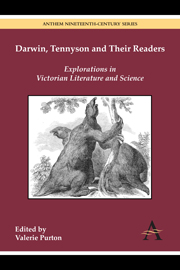Book contents
- Frontmatter
- Contents
- Introduction
- Chapter 1 Tennyson's ‘Locksley Hall’: Progress and Destitution
- Chapter 2 ‘Tennyson's Drift’: Evolution in The Princess
- Chapter 3 History, Materiality and Type in Tennyson's In Memoriam
- Chapter 4 Darwin, Tennyson and the Writing of ‘The Holy Grail’
- Chapter 5 ‘An Undue Simplification’: Tennyson's Evolutionary Afterlife
- Chapter 6 ‘Like a Megatherium Smoking a Cigar’: Darwin's Beagle Fossils in Nineteenth-Century Popular Culture
- Chapter 7 ‘No Such Thing as a Flower […] No Such Thing as a Man’: John Ruskin's Response to Darwin
- Chapter 8 Darwin and the Art of Paradox
- Chapter 9 Systems and Extravagance: Darwin, Meredith, Tennyson
- Chapter 10 T. H. Huxley, Science and Cultural Agency
- Notes on Contributors
Chapter 10 - T. H. Huxley, Science and Cultural Agency
- Frontmatter
- Contents
- Introduction
- Chapter 1 Tennyson's ‘Locksley Hall’: Progress and Destitution
- Chapter 2 ‘Tennyson's Drift’: Evolution in The Princess
- Chapter 3 History, Materiality and Type in Tennyson's In Memoriam
- Chapter 4 Darwin, Tennyson and the Writing of ‘The Holy Grail’
- Chapter 5 ‘An Undue Simplification’: Tennyson's Evolutionary Afterlife
- Chapter 6 ‘Like a Megatherium Smoking a Cigar’: Darwin's Beagle Fossils in Nineteenth-Century Popular Culture
- Chapter 7 ‘No Such Thing as a Flower […] No Such Thing as a Man’: John Ruskin's Response to Darwin
- Chapter 8 Darwin and the Art of Paradox
- Chapter 9 Systems and Extravagance: Darwin, Meredith, Tennyson
- Chapter 10 T. H. Huxley, Science and Cultural Agency
- Notes on Contributors
Summary
In a pioneering study of T. H. Huxley published in 1978, James Paradis made the claim that Huxley created, in his writing and public speaking combined, a ‘unique cultural agent’ — ‘the scientist’ In the present essay I want to explore the efficacy of this conception of science as cultural agency in terms of the encounter it stages or implies between, on the one hand, contemporary interdisciplinary protocols in the study of science within a humanities context, and, on the other, the field of debate between science and culture in Huxley's milieu and work. In addressing the cultural dimension of Huxley's intellectual work, Paradis was not the first commentator to identify a distinctly literary quality in Huxley's scientific writing. The concept of ‘cultural agency’ itself, however, derives from a more recent and precise paradigm which Adrian Desmond, whose work on Huxley I will consider alongside that of Paradis, proudly calls the ‘new contextual history of science’. ‘Culture’ in this context (more akin to Raymond Williams's expansive definition than to Arnoldian or Leavisite conceptions of excellence) is more readily associated with what became known, variously, as the science or culture ‘wars’ of the later twentieth century — struggles, that is, within which science and the humanities appeared to be disputing the same kind of epistemological terrain. Postmodernism, and with it the emerging confidence that humanities disciplines such as literary or cultural studies and philosophy could address themselves with legitimacy to scientific texts, concepts and debates, together constitute the principal contexts for these wars.
- Type
- Chapter
- Information
- Darwin, Tennyson and their ReadersExplorations in Victorian Literature and Science, pp. 153 - 166Publisher: Anthem PressPrint publication year: 2013



